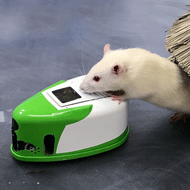Rats will ‘rescue’ trapped robot rats, study finds

The robots were then trapped in different enclosures and rats had the opportunity to open the door to one or both enclosures, freeing the robots.
New research suggests rats can form social connections with robots and will even ‘rescue’ them if they become trapped.
Scientists introduced rats to two rat-sized robots, one of which was ‘helpful’ and engaged in rodent-like social behaviour, including following, mirroring, exploring and playing with toys. The other robot was mobile but displayed only minimal behaviours, such as moving backwards and forwards and side to side.
Each rat was trapped in an enclosure and released by the helpful robot three times, while the other robot performed random movements in the arena.
The robots were then trapped in different enclosures and rats had the opportunity to open the door to one or both enclosures, freeing the robots.
Findings published in Animal Behaviour and Cognition show that rats rescued at least one robot 76 per cent of the time. And they displayed a significant preference for rescuing the helpful robot, over the unhelpful robot.
Robots are increasingly used to monitor or participate in social interactions with animals in their own environment. However, it was not clear whether animals would form positive social connections with these robots.
This is the first study to suggest rats show pro-social behaviour towards artificial entities.



 The veterinary mental health charity Vetlife is inviting the veterinary community to join it for a sponsored cold-water dip.
The veterinary mental health charity Vetlife is inviting the veterinary community to join it for a sponsored cold-water dip.